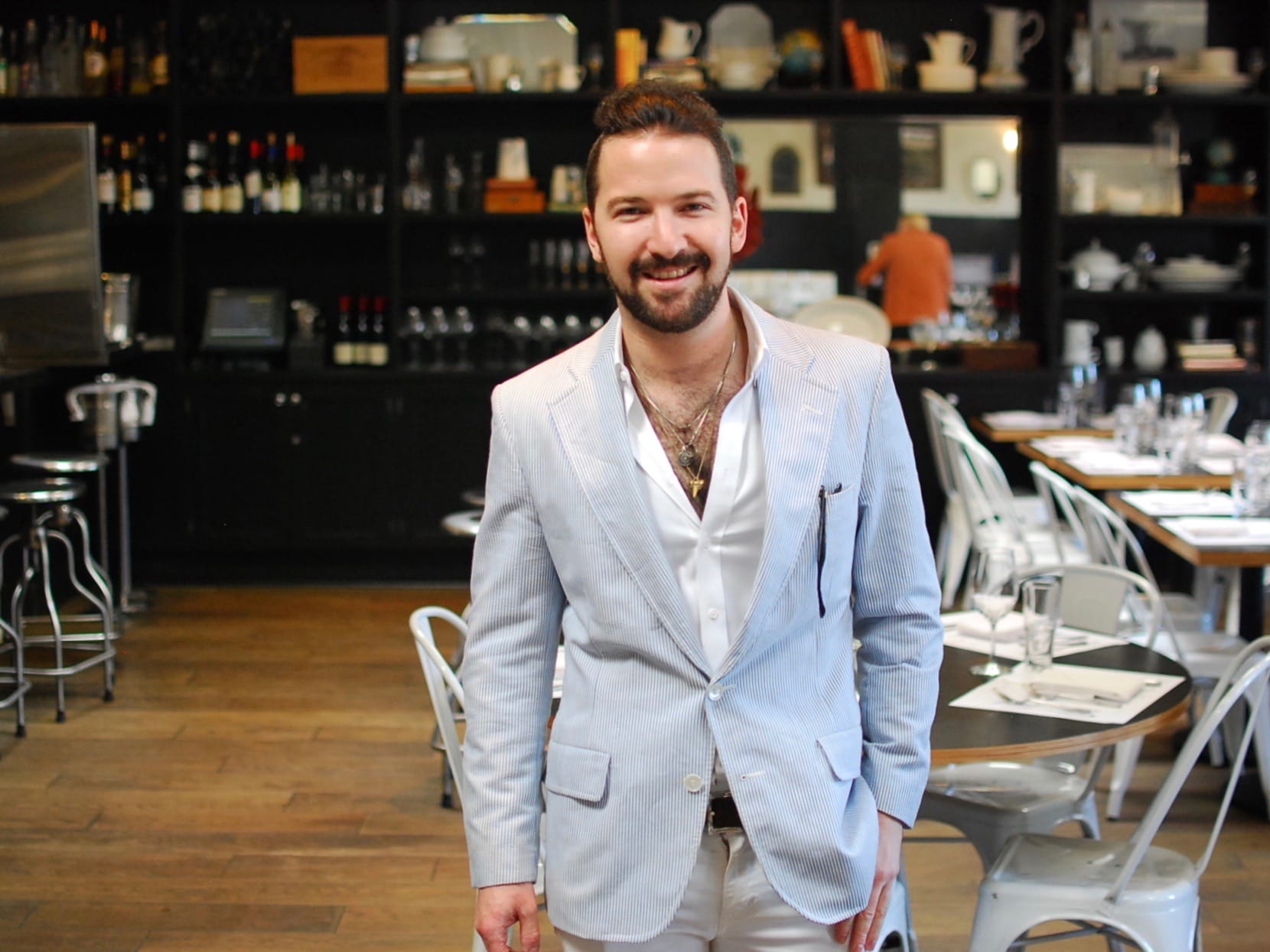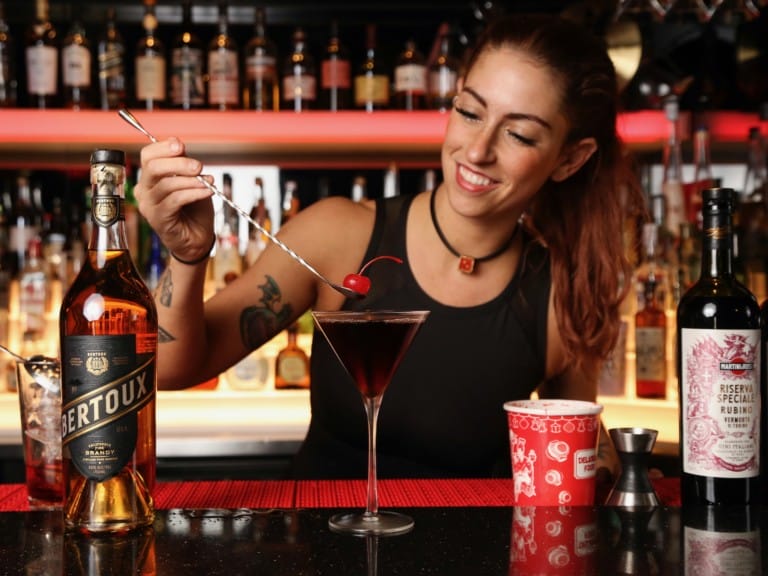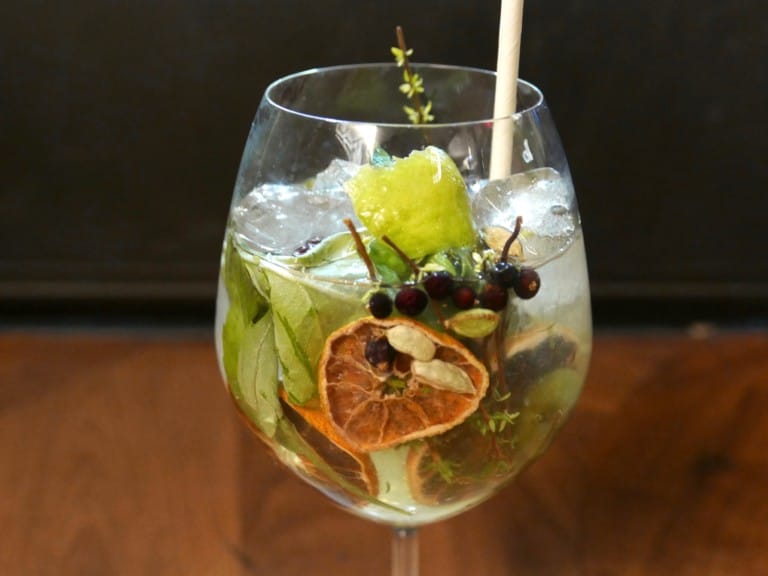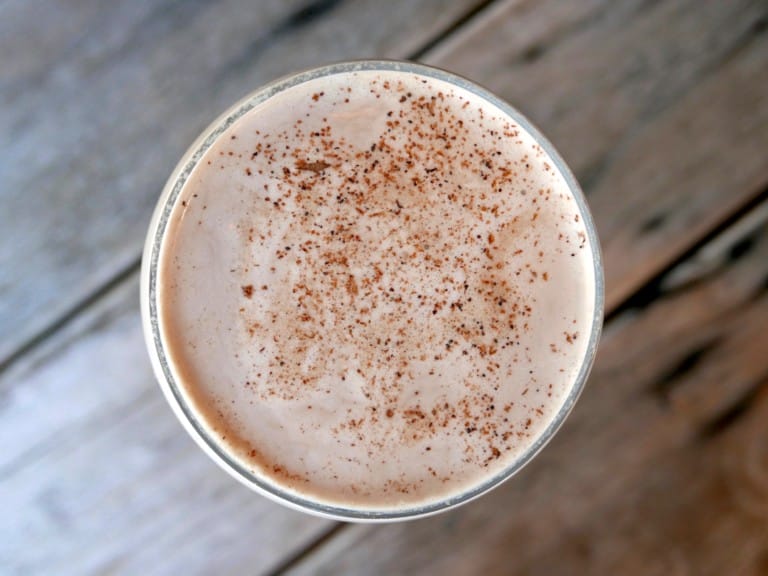In modern Manhattan, no cocktail establishment has been more influential than Milk & Honey, which Sasha Petraske opened to start 2000 on the Lower East Side. Australia native Sam Ross has been one of the key cogs in the bar’s success since 2004, working alongside Michael McIlroy. When Petraske decided to relocate Milk & Honey for 2012, he entrusted Ross and McIlroy with the space, which they’re transforming into Attaboy. We spoke with Ross at a Los Angeles establish he consulted on, Comme Ca, and he shared spirited insights that hint at why he’s been so successful.
Was it a given that you’d work with cocktails and spirits for a living, or did you consider other careers?
I never considered anything else. I actually did a short apprenticeship in a kitchen when I was a teenager and I loved the putting ingredients together side of it, but it didn’t have enough glamour for me. I started behind the bar when I was 15, barbacking, shitkicking, because everyone has to start somewhere, and I just fell in love with the systems of it, and always wanted to get to the next level. That top level was the artistry of the cocktails.
Are you at the top level now, or can you take it further?
Always learning. I’m always trying to get better. I’ve been doing this a long time, but you’ll still find me behind the bar at least four shifts a week. It’s where I belong, and I also treat it like training as well. Yeah, you have the big match on the weekend, but you’re always improving, every single shift, be it techniques, be it the drinks, or be it customer service, certain interactions. It’s just through experience that you get a little bit better. No, I’m definitely not satisfied just yet.
And then you have a new challenge with Attaboy.
Correct. It’s a little bit behind schedule, as any project is, I guess. Yeah, we’re moving toward the changeover at the new Milk & Honey, my business partner Michael McIlroy and I to take over and re-brand and renovate and do our own space at the old Milk & Honey location.
What’s the criteria for a cocktail you would serve at Attaboy, versus Milk & Honey?
See, the thing about it is that what me and Michael have been doing at Milk & Honey for the past seven years, that’s us, that’s what we do. A lot of people in the chef world might break off and do something drastically different, but this program that we operate at Milk & Honey has very much been influenced by us, us pushing it forward, along with Sasha [Petraske], and the bartenders we’ve had there. This is our baby. This is our techniques. These are our drinks. I mean the setting’s going to be a bit different, and we’ve got a few different quirky ideas, but the drinks that we’re making we think are the best that you can get anywhere, and we wouldn’t want to compromise that at Attaboy. The drinks that will be at Attaboy, we like to think are the best that you’ll be getting anywhere as well.
Will you still be involved in Milk & Honey once it relocates?
I don’t think we’ll have time. Sasha obviously is our partner out at Attaboy and ideas and we’ll all be family and very much – I’d love to maintain a shift up there, I just don’t know if there will be time – especially with – owning our business is going to be pretty time consuming, I imagine.
In terms of collaboration with Michael and Sasha, do you all have to agree for a drink to get served?
We talk about it. Especially me and Michael, we’re very honest with each other. It’s easy to make a drink – we’re very critical of each other, and if a drink needs work, we’ll tell each other, because we’ve known each other for 10 years. We can take it. We’re not that sensitive. There definitely is a process. Before it gets widely accepted into the family – same thing if they come up with drinks at Dutch Kills or Little Branch or Silver Lining, or The Varnish out here, if it’s a real winner, it goes through quite a process of testing and criticism before it gets expressed to all the coasts and all the family’s bars. And Eveleigh in Melbourne, same deal.
Would you say that you’ve had any mentors over the years?
Plenty. Yeah, yeah, yeah. I started in Australia and two bartenders that I worked under in my early days, Quentin Liebenberg and Sebastien Raeburn, were both heavily influential characters in my career. And then coming over, obviously Sasha. Those are the big three.
What would you want people to know you for as a bartender?
You know what I really strive for? You can teach anyone how to make drinks. You can, if given enough time. Drinks and techniques, and with enough experience, the techniques will come, and efficiency, but I’m a friendly guy. I like people. And there are a lot of people in this industry that don’t like people, and it’s really strange, because the service industry is heavily involved with interactions with customers, with people you don’t know. I find that I have a friendly personality back there, as well as striving to make the best drinks possible.
What does a cocktail have to be if it goes on your menu? Are there any common threads?
Again, we always preach simplicity. We do twists on classics. Part of what I was just teaching these guys in the class, if they’re putting upwards of five or six ingredients in their cocktails, then they’re not trying hard enough. We use high quality spirits, fresh juices, handmade syrups, and we really preach simplicity, really let these flavors and these ingredients speak for themselves. You ask any good chef as well, you start putting too many ingredients into these dishes, these drinks, the flavor becomes muddy. You can’t necessarily distinguish between what you’re drinking. So off the bat, if you see something that has too many ingredients in it – I’ll try anything once, same with techniques – but my initial instinct would be critical if I see too many ingredients in it.
What’s your top selling cocktail at Milk & Honey, and why do you think that’s the case?
Well, because it’s a menu-less bar at Milk & Honey, it’s sort of like a roving list. But I would say the top five drinks we do there would definitely be a Negroni, a Dark and Stormy. The Penicillin’s definitely up there. Daiquiris and their variations, and definitely like a Manhattan/Old Fashioned and the variations on them. I’m astonished in the last few years, there’s no such thing as girlie drinks anymore. Females are drinking the hardest and smokiest of whiskeys. Gender in drinks doesn’t exist anymore.
Is it that it doesn’t exist for the bartending community, or it doesn’t exist for the customers?
The customers are a lot more intuitive these days. They know about their product a whole lot more. They know what they’re drinking. When I started at Milk & Honey in 2004, people didn’t know what they wanted. There was vodka cranberries and now we’ve been through so many phases that I’ve experienced over the years, through this mojito phase, which seems to have died off a little bit. And I’m a big fan of the mojito, so I’m definitely not being critical of that drink, and us, as the bartender elite, we’re very critical of vodka. We’ve definitely seen our impact on society. People are asking for vodka less and less and less now, which is great in a cocktail sense. Again, I’m not a vodka hater, it’s definitely appropriate for certain things, but cocktails, not so much. And now you’re just seeing this trend toward flavor, whiskeys and amari, things that are bitter and smoky, which is great.
As far as naming cocktails, what’s your general approach?
I let Michael name the drinks. It was his idea to come up with the name Attaboy. He comes up with fantastic drink names. Often I’ll think of a word or a name for a drink, like, “That’d be a really sweet cocktail name.” Then maybe the next drink I create, I’ll give that the name, but for the most part, Michael’s in charge of naming things.
What do you look for when you’re hiring bartenders?
Personality, first. Without a doubt. Because like I said, you can teach drinks, you can teach recipes and that sort of thing, you can’t teach personality. You can’t make somebody that doesn’t like people, you can’t teach them to like people. It doesn’t exist. Personality and willingness to learn. We often prefer to take on a clean slate, somebody that doesn’t practice. Because our methodology can be very different from a lot of other places, and people who have been working in places with less of an emphasis on methodology can come in with these bad habits that they might be unwilling to break. It’s often easier to take on somebody with less experience, but a more open mind, than someone who comes in with these bad experiences and less willingness to take on what you’re preaching. Because we can answer. If you ask us any question about our methodology, we can tell you why we do that, and why we think it’s superior to say, alternative methods. We’ve done nothing that hasn’t been tried and tried and tried again, and scrutinized over. There’s no piece that we haven’t tried every other aspect of, so we can back it up.
When you’re behind the bar, what kind of music do you listen to?
That’s tricky because we listen to a lot of jazz and ragtime and big band. I like a lot of old reggae. And I love a lot of the old soul, Bill Withers and Aretha Franklin, and sort of like ’50s and ’60s, the precursor to early soul and R&B.
So the music kind of has to fit with the theme a little bit?
It does. It does. We’re still going to be playing, we still love our jazz and our big band, and that will have an influence at Attaboy, but I think you’ll see us moving into the ’50s and ’60s, some early rock and roll.
How are you able to maintain balance in your life, if you’re even able to?
I’m a night owl. Even as a kid when I was in school, I could never go to bed before 3 and I was just useless in the mornings. This is normal to me. This always has been normal. Aside from being in a bar, any sunshine you can get is beneficial. That’s why I’m more than happy to come out to California.
What do you like to do to stay active?
I play tennis. I swim in the summer. I try and run. I don’t like running that much, but I try to do it. I’ve been playing tennis and swimming.
What about in high school, were there any sports that you played?
Yeah. Cricket was my favorite sport growing up. I played Aussie rules football, but everyone got bigger than me, and I didn’t have the guts for it, to be honest. I’m fanatical about baseball. I’m a huge Mets fan and I go out to a bunch of games a year. That’s something I started when I came over in 2004. It gets steadily more and more an obsession, Mets and baseball, and I love the fact that there are 162 games a year. This is amazing to me. Cricket was my big thing in high school.
I imagine that’s something to find a game of in New York.
A pick-up game of cricket isn’t the easiest thing to find.
Who’s somebody that you’ve never worked with behind the bar that you would most like to work with?
Erick Castro, a bartender out of San Francisco. I admire the hell out of him. He’s hilarious. He’s like what I was telling you about, that good mix of great drinks, methodology, but somebody who’s hilarious, somebody you want to be sitting in front of. Hopefully I will get to work with him in the not so distant future, but two bartenders I really admire – aside from Michael of course – Anthony Schmidt in San Diego, who runs Noble Experiment, and Erick Castro.
Where and what do you like to drink when you’re not working?
I drink it all. There are nights when I want to go out and drink beers and shots of whiskey. I drink a lot of Negronis. I love my wine as well. It’s all about balance. It’s like food. I’m always in different moods. Sometimes I’m drinking smoky Scotches. Sometimes I’m drinking Negronis. The full gamut.
Any go-to establishments?
In New York, aside from the family’s bars, I find myself up at The Raines Law Room, which is great. But I like boozers as well. We go to Bua on St. Marks, and they’ve got a new spot on the Bowery, called The Wren, which is great. Then I spend a lot of time in Brooklyn. I love Clover Club and Henry Public. I’ve got an old Vespa that I ride around. That’s what we do in Brooklyn.
If you could travel to any city in the world right now, primarily to drink cocktails and spirits, which city would you go to and how come?
Tokyo. Every year upon year, I’m like, “This is the year I’m going to go to Japan. This is the year I’m going to go to Japan. This is the year I’m going to go to Japan.” And it hasn’t happened yet. I need to go to Japan. I need to go to Tokyo and experience it.
If you could only drink one more cocktail, one single cocktail, what would be in the glass?
That’s a really tricky question. I guess I would have to finish it all with a Negroni. It would have to be a Negroni.
Who would you let make it for you, if you couldn’t make it yourself?
My mum. My mum can mix a mean Negroni.









Blog Comments
PUNCH – Can Elyx Fashion a New Image for Luxury Vodka? – Spirit-Hunters
August 30, 2016 at 7:56 AM
[…] a nearly two-decade drought, there’s movement in the craft cocktail scene—a scene that has notoriously shunned the idea of “luxury” vodka—towards the up-market once […]